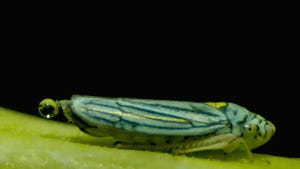
This Insect Pees at High Speed Using a 'Butt Flicker' and Superpropulsion - CNET
Everybody and just about everything pees. Some things, it turns out, just do it by flicking liquid away from their backsides at extremely high speed using an anal stylus.
That highly unusual scenario sums up the work of researchers at the Georgia Institute of Technology about how a leaf-hopping insect called the glassy-winged sharpshooter relieves itself. While it may sound esoteric, what they’ve discovered may one day provide technological advances like quickly ejecting water away from sensitive electronics.
The investigation into the sharpshooter’s excretion process began the way many scientific journeys start: pure curiosity. Saad Bhamla, an assistant chemical and biomolecular engineering professor, noticed one of the insects would repeatedly form a perfectly round droplet of liquid on its tail and then launch it away at blurring speed.
“Little is known about the fluid dynamics of excretion, despite its impact on the morphology, energetics, and behavior of animals,” Bhamla said in a statement. “We wanted to see if this tiny insect had come up with any clever engineering or physics innovations in order to pee this way.”
Studying the bug with high-speed video and microscopes revealed the sharpshooter does possess a particular part that enables its impressive pee performance: an anal stylus that Bhamla dubbed its “butt flicker.”
Bhamla compares this feature to the flippers on a pinball machine that the sharpshooter uses to launch droplets of urine at incredible speed. The flicker can accelerate the liquid more than 10 times the rate of the fastest supercars.
“We realized that this insect had effectively evolved a spring and lever like a catapult and that it could use those tools to hurl droplets of pee repeatedly at high accelerations,” explained Elio Challita, a bioengineering graduate student who worked with Bhamla.
The team’s research is published in this week’s issue of the journal Nature Communications.
When the researchers clocked the speed of the flicked droplets they noticed the pee drops traveled even faster through the air than the flick of the sylus that launched them. This suggested the presence of superpropulsion, a phenomenon not observed in natural systems up until now.
Superpropulsion happens when an elastic projectile gets an energy boost by synching up compression and launch timing. One way to visualize this is to imagine a diver launching off a springboard at just the right moment to get the maximum boost from the spring effect. It seems the sharpshooter’s stylus does something similar by compressing the droplet before launch, storing extra energy via surface tension in the liquid that then gives it a speed boost when flicked.
The researchers believe pee flicking is the most efficient way for sharpshooters to process the massive amount of plant sap that they drink each day to survive — up to 300 times their body weight.
Flicked pee helps you and me
Researching the bathroom habits of sharpshooters could have some direct benefits for humans because the insect is a major pest causing millions of dollars in damage to crops, especially in vineyards and citrus orchards in California and Florida. The species is expected to spread with climate change, and this new discovery could make it easier to track the species’ spread and inform insights that help control their reproduction.
However, engineers may also learn from the sharpshooters’ biology and develop new systems to eject water from wearable electronics.
“What the sharpshooters are dealing with would be like us trying to fling away a beachball-sized globe of maple syrup that was stuck to our hand,” said Miriam Ashley-Ross, a program director at the US National Science Foundation, which partially funded the work. “The efficient method these tiny insects have evolved to solve the problem may lead to bio-inspired solutions for removing solvents in micro-manufacturing applications like electronics or shedding water rapidly from structurally complex surfaces.”
It’s crazy the things we can discover from taking just a second to ponder a droplet of bug pee.
“This work reinforces the idea of curiosity-driven science being valuable,” Challita said. “And the fact that we discovered something that is so interesting — superpropulsion of droplets in a biological system and heroic feats of physics that have applications in other fields — makes it even more fascinating.”

